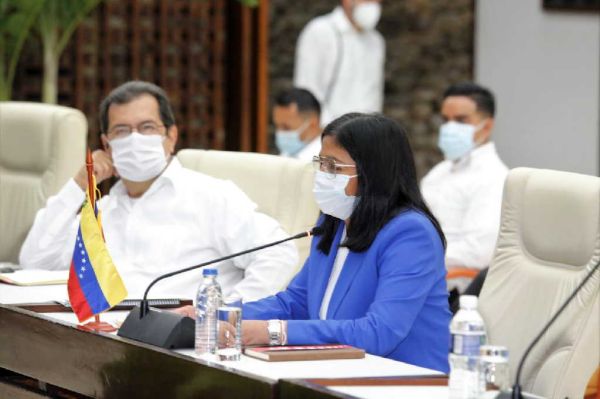
The 21st Session of the Cuba-Venezuela Intergovernmental Cooperation Commission concluded Tuesday in Havana, after the signing of the final minutes of the meeting and the respective agreements and projects.
The exchange was presided over by Cuban Deputy Prime Minister and co-president of the Commission, Ricardo Cabrisas, and the executive Vice President of Venezuela and co-president, Delcy Rodríguez. The meeting was also attended by ambassadors and ministers of the two republics.
Both parties acknowledged the validity of the principles of solidarity, collaboration and integration contained in the Integral Cooperation Agreement, signed on October 30, 2000 by Commanders Fidel Castro and Hugo Chávez.
The delegations highlighted the relevant performance of the Cuban collaborators, together with the Venezuelan health authorities and the institutions of the infrastructure of the Barrio Adentro Uno and Dos health programs, in the fight against the COVID-19 pandemic.
In this sense, they agreed to give continuity to this assistance, which includes actions related to Cuba’s results in the development of its four vaccine candidates.
The participants pointed out that progress is being made and deepened in socio-productive projects with a medium and long-term vision to face the socio-economic complexities, and this will serve as a basis for the elaboration of the Resilience and Development Plan (REDE) 2020-2030, to be prepared this year.
During the meeting, special mention was made of current trade, based on the progress made last year with the establishment of a financial mechanism to facilitate bilateral trade relations for the development of Venezuelan productions and the satisfaction of the needs of the Cuban economy.
In general, the determination to advance in the improvement and expansion of ties in all spheres between both peoples was ratified, as a way to overcome the negative effects of unilateral coercive measures and the economic, commercial and financial blockade imposed by the United States.
Those present agreed to hold the XXII Cuba-Venezuela Intergovernmental Commission for Cooperation in the city of Caracas during the second half of 2021, on a date to be defined through the corresponding diplomatic channels.
Within the framework of the meeting, an intergovernmental agreement on agri-food matters and a cooperation project for the expansion and integral use of moringa, thitonia, mulberry and other pasture crops in the Bolivarian Republic were signed.
At the close of the event, Cabrisas emphasized that in these complex times, they are concentrating their efforts to identify actions and projects whose impact, based on the efficient use of resources in these regions, will help overcome obstacles and provide the level of sustainability required by the economies of the two countries.
He commented that to this end, they have accumulated experience over more than 20 years, in order to turn the Integral Agreement into a model of integration for the peoples of Latin America, and to this end, they are incorporating new initiatives.
The Deputy Prime Minister insisted on the need for rigorous follow-up in the implementation of the plan approved for this year, aimed at strengthening and improving key sectors such as health and agri-food, and important activities in other areas such as energy, transportation, education, culture and sports.
Rodriguez highlighted the achievements in these decades of bond between Cuba and Venezuela, in which more than 248 thousand Cuban collaborators have provided health cooperation in Hugo Chavez’s homeland, more than four million surgeries have been performed and medical examinations within the framework of the Barrio Adentro mission exceed 700 million.
He thanked the people of Cuba for being the first to offer their help to Venezuelans in 2020, in the midst of the crisis due to the new coronavirus; and added that they were also the first to arrive when Venezuela suffered one of the worst attacks to the national electric system in March 2019.
He reaffirmed that the U.S. government has not been able and never will be able to destroy the revolutionary processes of Cuba and Venezuela with its genocidal siege and hostile policies.
 Escambray ENGLISH EDITION
Escambray ENGLISH EDITION





Escambray reserves the right to publish comments.